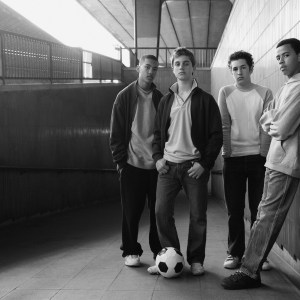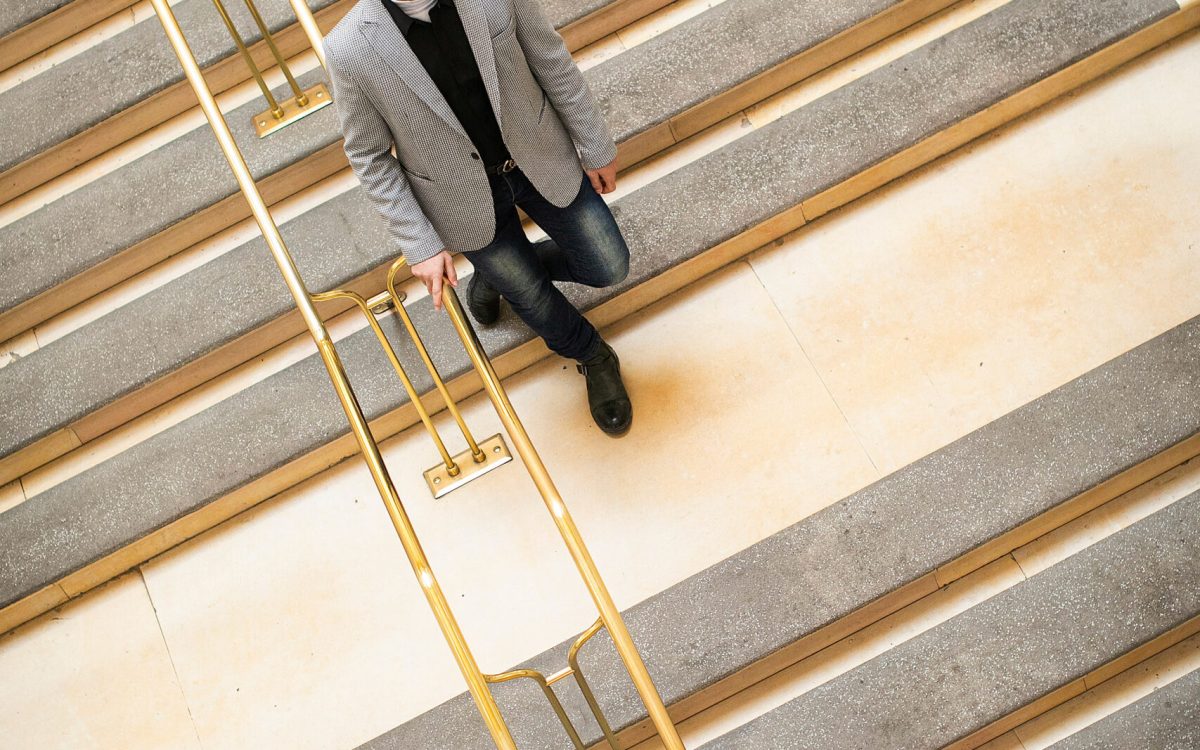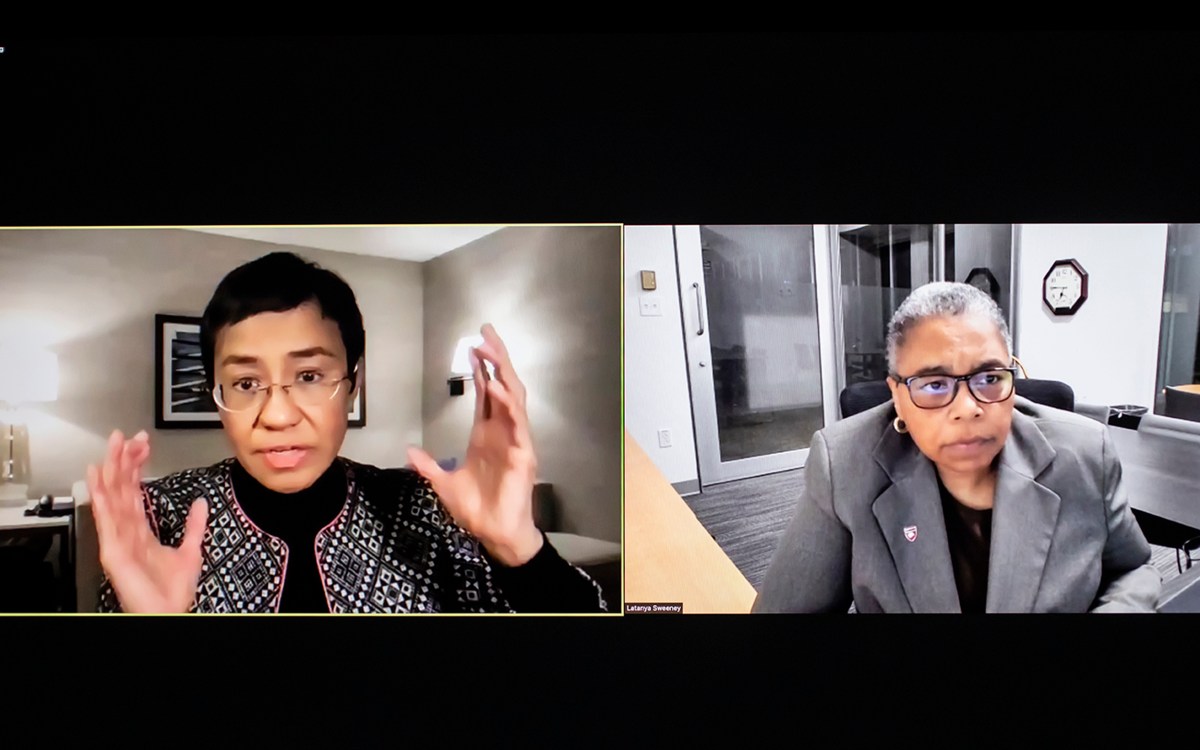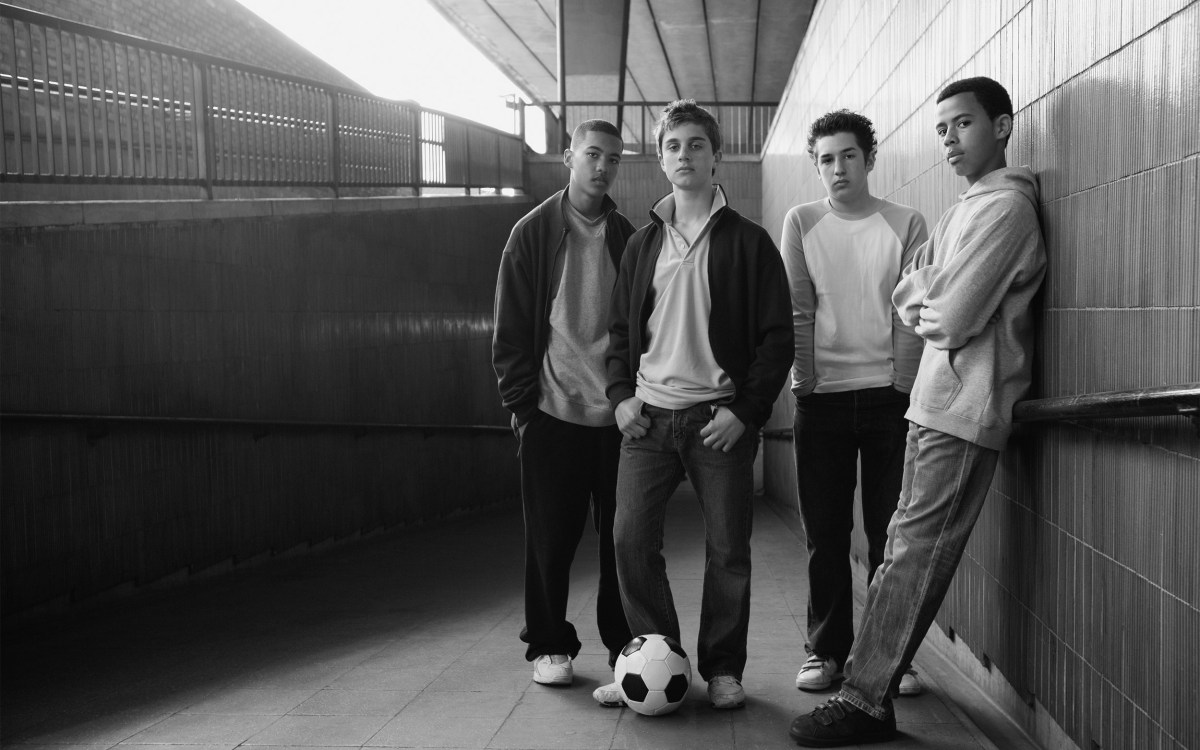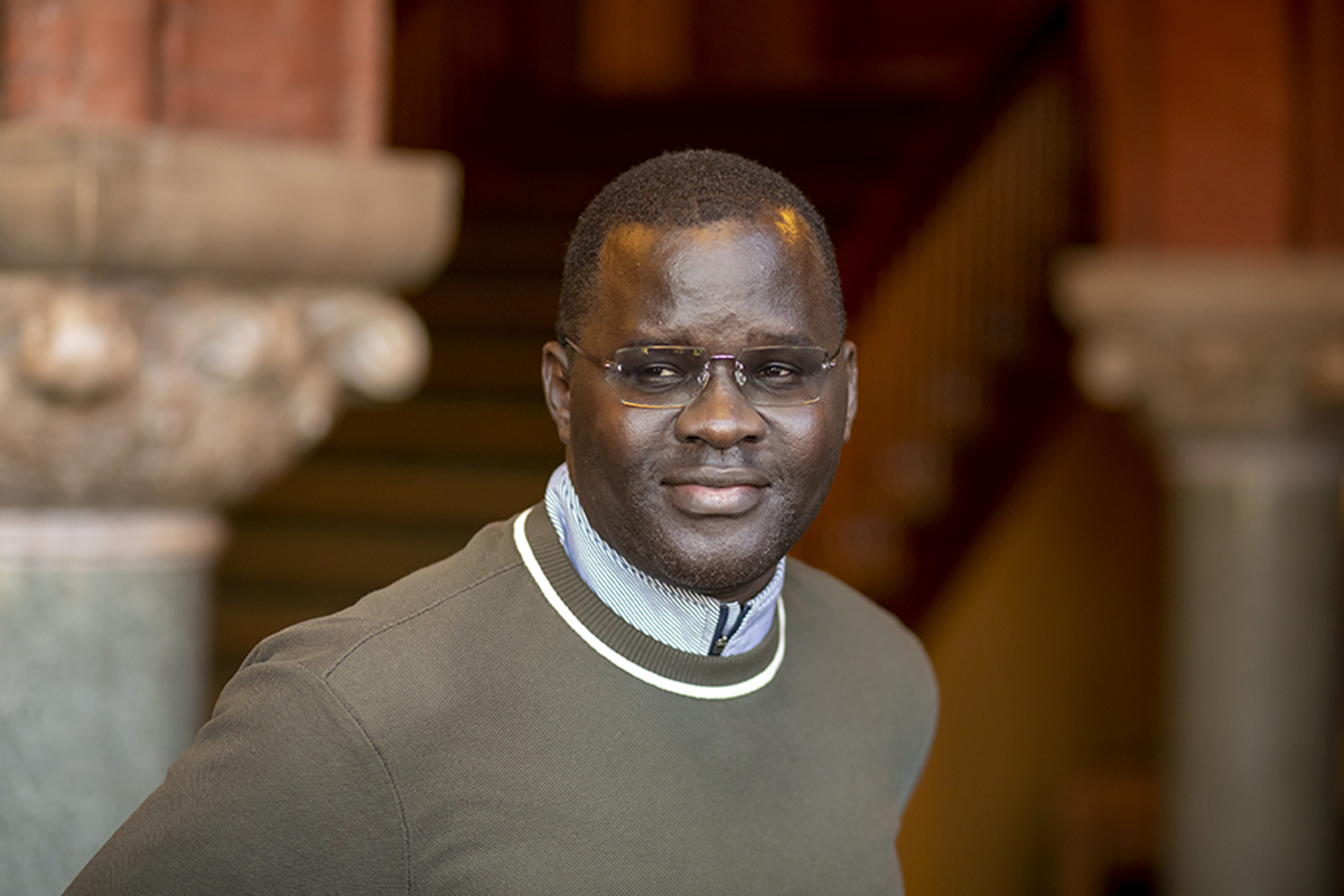
“My hope is that Uganda is going through the birth pangs of democracy. … The population is yearning for it.”
Photos by Rose Lincoln/Harvard Staff Photographer
Fighting for human rights in riven land overseen by repressive regime
Scholar at Risk and lawyer Nicholas Opiyo describes how growing up during Ugandan civil war shaped his future
It’s difficult listening to Nicholas Opiyo describe his early life in Gulu, a city in the northern region of Uganda that from 1984 to 1996 was caught in a civil war between violent rebel groups and the brutal government forces of President Yoweri Museveni.
He recalls how one of the main insurrectionist groups, the Lord’s Resistance Army, led by warlord Joseph Kony, infamously made widespread use of forced child soldiers; how government troops raped members of his family who later died of AIDS; how authorities forced residents of his village into displacement camps that became “death traps.” He remembers his father’s detention and torture, his sister’s capture by the Lord’s Resistance Army, and “walking over dead bodies to go to school.”
“That was my unfortunate childhood experience,” said Opiyo. “I grew up as a front-row witness to heinous violations of human rights by both government forces that were supposed to protect the population, and by rebel forces.”
Such horror might have turned others to despair, or violence. It turned Opiyo, a Harvard Scholar at Risk, to the law. As a human rights lawyer he has spent his career defending civil rights and political freedoms in his country, including campaigning against unfair electoral laws, the restriction of freedom of assembly, the suppression of freedom of speech and freedom of the press, and promoting LBGTQ+ rights.
In December, the Dutch Ministry of Foreign Affairs bestowed on Opiyo the 2021 Human Rights Tulip award, an annual honor that recognizes individuals and organizations devoted to championing and defending civil rights and freedoms. At an acceptance ceremony in the Hague, Opiyo said the award had strengthened his resolve “to go beyond the challenges of our work and to keep fighting for a peaceful, just, and fair society.”
That work has been a lifelong mission.
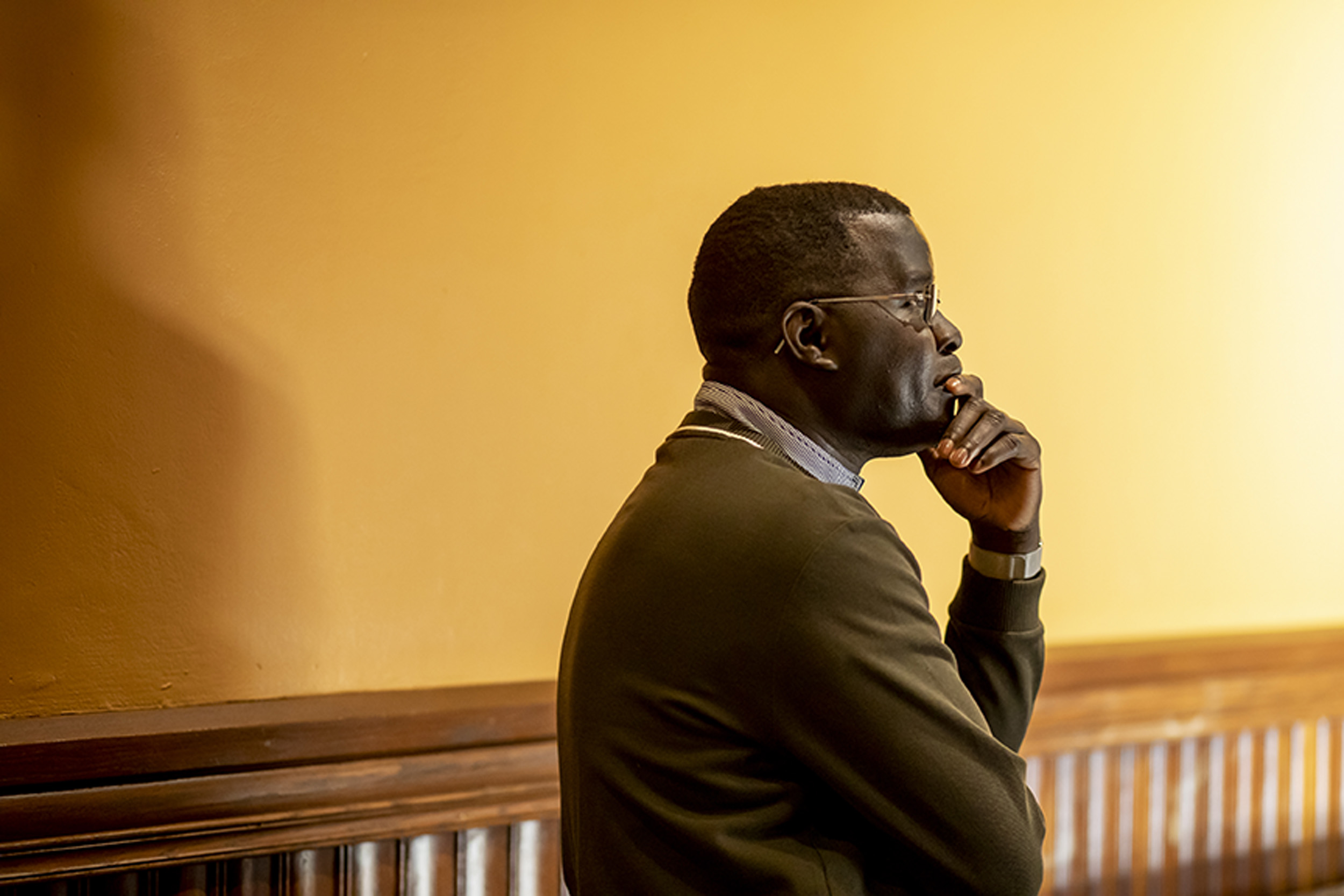
From an early age, Opiyo knew he wanted to make a difference in the lives of ordinary people, to speak, he said, “for the vulnerable and voiceless.” Listening to the BBC as a boy he became “interested in world affairs, in current affairs, in news and contemporary things” and in using journalism to shine a light on injustice. But Opiyo’s focus changed in 1994 when his cousin Norbert Mao (currently the president of Uganda’s Democratic Party) ran in his first election for Parliament with a goal of helping the country craft a new constitution. Mao lost, “but he was so articulate. He was so inspiring. Many people of my generation were just captivated by him,” said Opiyo. “He became our idol, our hero.”
When Mao ran again two years later, Opiyo worked as his personal assistant. “He was a lawyer, and from then on, I wanted to be a lawyer. I wanted to be like Mao, to work for the Legal Aid Clinic of the Uganda Law Society, a pro-bono clinic helping poor people defend their rights. That was my turning point.”
Opiyo attended Uganda Christian University, balancing his legal studies and work for the Legal Aid Clinic during semester breaks with involvement in a range of campus causes. As a student guild minster in his first year at Uganda Christian, he led a protest against the university when it attempted to double tuition; he also sought a meeting with the National Council for Higher Education and helped end the university’s practice of dismissing pregnant unwed students. “Throughout my university years, I was involved in one human rights struggle after another for the causes that felt dear to me,” he said. “I fought injustice and stood up against the high-handness of the university administrators and often prevailed.”
“My every intention is to go back to Uganda when I feel safe enough to go back. … That is where I am needed most.”
After passing his bar exams in 2006, Opiyo continued working for the Legal Aid Clinic and began teaching part-time at the newly opened Gulu University where he helped establish the Center for Peace and Conflict Studies — now the Institute for Peace and Strategic Studies.
Later he worked in Kampala monitoring human rights violations in the country. In 2012, he founded Chapter Four Uganda, a nonprofit devoted to the protection of civil liberties. The organization has been the driving force behind a range of campaigns, including the successful effort to pass a law criminalizing torture in 2012. In 2014 his group helped overturn the nation’s Anti-Homosexuality Act, which criminalized same-sex relationships.
But the work came with a cost. Opiyo recalled an incident in which a stranger spat in his face, accusing him of being “an agent of foreigners.” Some family members disowned him, and Christian lawyers conspired to remove him from his position as secretary general of the National Bar Association.
Through it all Opiyo never wavered in his belief in human rights and the rule of law. He even spent years defending a rebel commander who had committed crimes against his own family. “This particular rebel leader was also abducted as a child,” said Opiyo. “In him, I saw my sister. I saw myself. It could have easily been me. He was both a perpetrator of violence as well as a victim of it, and I thought I owed him a duty and responsibility to offer him the best legal defense possible.”
Over time, threats to his safety increased. Police descended on Opiyo on Dec. 22, 2020, blindfolding him and taking him into custody on what he says were trumped-up charges of money laundering. He was sent to a maximum-security prison on the outskirts of Kampala. His arrest, he said, was triggered by his group’s efforts to push back against government crackdown on civil society and its investigations into extrajudicial killings by government security forces during the 2021 general elections. (Museveni would be re-elected to a sixth five-year term amid allegations of vote-rigging.)
Yet even behind bars, his work never ceased. Detained for just over a week, Opiyo offered legal advice to his fellow prisoners, eventually helping 68 secure release. Amid international pressure, Ugandan authorities dropped all charges against Opiyo and released him. Eight months later, the government shut down his nonprofit, froze its accounts, and, Opiyo feared, was “planning something more nefarious.”
Opiyo arrived at Harvard last fall as a Scholars at Risk Fellow hosted by the Harvard Kennedy School’s Carr Center for Human Rights, with additional support from the Roy and Lila Ash Center for Democratic Governance and Innovation, the Hutchins Center for African & African American Research, and the Edmond J. Safra Center for Ethics. For the past few months, he has been taking classes, giving talks, working on a research project, and making himself available to students with “research interests on the continent,” he said.
But a return to Uganda is in his future. “My every intention is to go back to Uganda when I feel safe enough to go back. My work is really in Uganda,” he said. “That is where I am needed most.”
In his homeland, Opiyo said, people are eager for change, for a better country. “My hope is that the country is going through the birth pangs of democracy,” he said. “Change is nigh, and the country will be better for it. The population is yearning for it. And if we continue working hard at it, we can make Uganda a democratic, just, and free country.”

